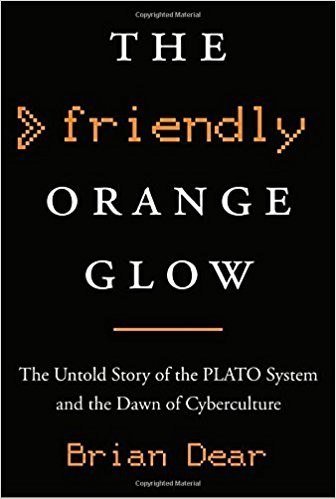Soh Kam Yung reviewed The Friendly Orange Glow by Brian Dear
A fantastic telling of a computer system that gave rise to current computer culture.
4 stars
The fascinating story of PLATO, a computer system initially developed as a means to explore computer education techniques, but ended up creating the 'cyberculture' around gaming (both single and multi-user), social media (in the form of shared notes and messages), resource searching, etc., well before BBSes (on-line bulletin board systems), AOL, the World Wide Web, Google, or Facebook even existed. While PLATO no longer exists, its legacy would affect today's internet culture.
The book starts with the creation of electronic computers and researchers like B.F. Skinner, who start to develop theories about how education might be made better via computers. The University of Illinois would be one of the groups who would try to develop a computerised education system. Conflicts between engineers (designing the system) and educationist (with their own theories of education) would cause the project to be delayed. Then Donald Bitzer hears about the project, decides to …
The fascinating story of PLATO, a computer system initially developed as a means to explore computer education techniques, but ended up creating the 'cyberculture' around gaming (both single and multi-user), social media (in the form of shared notes and messages), resource searching, etc., well before BBSes (on-line bulletin board systems), AOL, the World Wide Web, Google, or Facebook even existed. While PLATO no longer exists, its legacy would affect today's internet culture.
The book starts with the creation of electronic computers and researchers like B.F. Skinner, who start to develop theories about how education might be made better via computers. The University of Illinois would be one of the groups who would try to develop a computerised education system. Conflicts between engineers (designing the system) and educationist (with their own theories of education) would cause the project to be delayed. Then Donald Bitzer hears about the project, decides to lead it and come up with his own concept of a computerised learning system.
Instead of a computer system that would favour one theory of learning over others, Bitzer designs a system that could be used to showcase any method of education using computers. But one requirement would make his system (now called PLATO) a favourite among its users. In an era of centralised computers (mainframes), batch processing and print terminals, PLATO would be a time-shared system with a 'real-time' response to input from any user: input from a user must be processed by the computer and a response returned to the user within tens of milliseconds. This would be a revelation to people in the era used to producing code on punched cards, sending them for processing and getting the result hours (or days) later.
Another innovation at the time would be the display used by PLATO. A bit-mapped plasma display, it would emit a 'friendly orange glow' that would make PLATO stand out from other display terminals that usually gave a white glow. Then, the idea of using the display to provide input to the system (instead of just being a display of output) would give rise to the idea of visual editors, causing programming productivity to rise. The display and programming methods would also lead to innovations in how the system would be used to provide educational software.
The 'culture' that would form around PLATO would lead to a rise in its popularity. Bitzer's policy over system usage would be very open: anybody, even high-school students, could use the sytem. This would lead to 'unofficial' uses of the system, like gaming, and innovations, like a shared notes system and messaging, that would draw people in to use the system when it was not being used for producing and providing educational needs. This openess would lead to friction between Bitzer and the university at times, and once also involved the US federal authorities when a motion to impeach Richard Nixon over the Watergate Scandal was distributed over PLATO.
A section of the book is also given on some of the more prominent people who used PLATO and the influence they would have over today's computer culture. Innovations like single and multi-user games (from arcade type games and simulators to dungeon based ones and leisure based ones like Solitair and Mahjong), messaging, sharing of notes, newsletters, and even the culture of hacking (looking at ways to overcome or bypass security or administration blocks in the system) would arise from PLATO.
The apparent popularity of PLATO would fuel Bitzer's ambition for the system to be used more widely, even overseas. He worked with CDC to commercialise the PLATO system. This would lead to the decline of PLATO when this did not work out as planned. The corporate culture of CDC (which didn't understand the free-wheeling culture around the PLATO system) would lead to delays and mis-handling of the system. The rise of microcomputers (lead by Apple and others) would also be ignored by CDC and Bitzer until too late: why pay to connect to a central computer running PLATO when your own home computer could now do many of the things PLATO could do.
Despite the fall of PLATO, the culture that grew up around it has survived and has flourished in the current internet. Much of the software and on-line culture that we are now familiar with originated from PLATO. And that is, perhaps, the best legacy of a system now mostly forgotten except by the people who were once able to experience its friendly orange glow.



